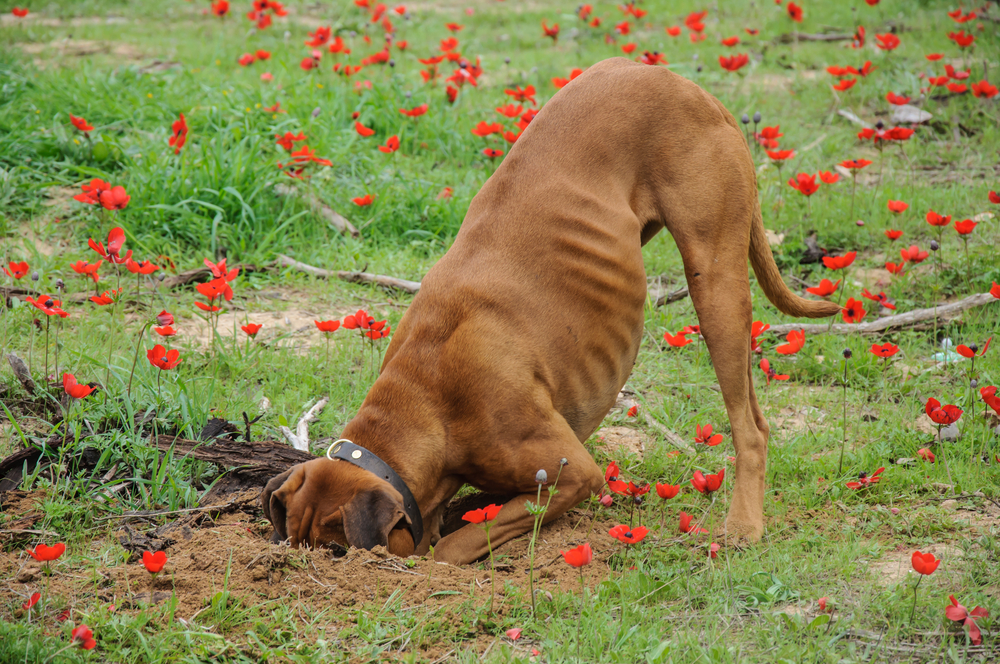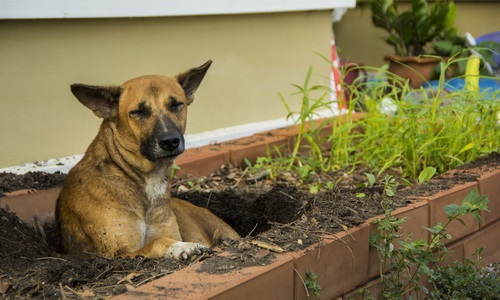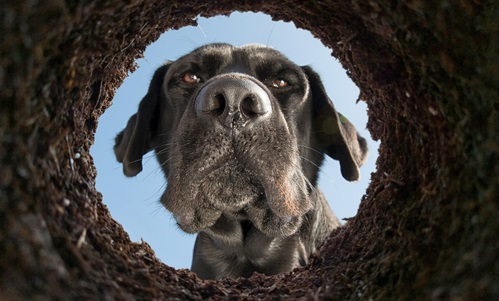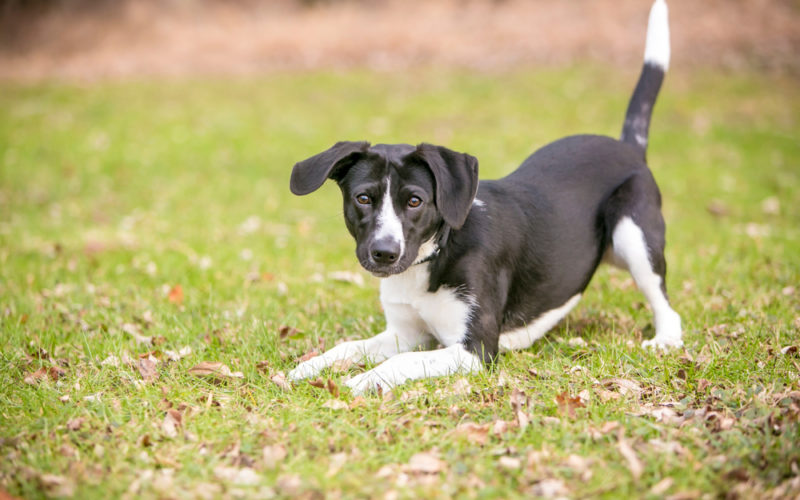Do you have a four-legged landscaper rearranging your yard? Lawns, gardens, public parks—some dogs are all-too-eager to get their paws on anything they can. If you’ve noticed this behavior in your pup and you’re wondering what can be done, rest assured, you can save your flowers from your dog’s digging obsession.
The question is how do you get a dog to stop digging?
There’s no single solution, after all, every dog is different, but we’ve put together plenty of options for you to try. Through hands-on training, plenty of playtime, and some health-helping treats, you change your dog’s behavior and address the underlying causes of the digging. It’s time to get those paws out of the dirt.
Why Do Dogs Dig?
Before you can figure out how to get a dog to stop digging holes, it’s important to understand why your dog is digging. There are a variety of reasons why your dog might be tunneling through your backyard, and some might even surprise you. You can also read our blog post answering the question, “why is my dog acting weird?”
#1 It’s In Their Genetics
Deep down, dogs are instinctual animals. That’s why they bark, growl, and chase without ever being taught to do so. When it comes to digging, you can thank your dog’s wolf ancestors for passing down the instinctual urge to throw dirt.
While excessive digging isn’t a survival instinct, it’s important to note that it is a natural behavior.
In fact, many breeds of dogs are commended for their digging abilities. Some breeds that are particularly fond of digging include:
- Terriers
- Huskies
- Beagles
- Schnauzers
- Malamutes
- Border Collies
Many of these breeds were used for generations to hunt rats and other rodents that were prone to destroying crops. Their digging skills made them invaluable members of the household. Unfortunately, these digging skills aren’t quite as useful for the average pet owner.
#2 They’re Protecting and Safe-Keeping
Dogs are natural defenders. Even the tiniest chihuahua can be a diligent guard dog for their beloved owner. This also means they’re very protective of their territory and their stuff.
Digging may be a result of a protective instinct, especially in scenarios such as:
- Digging a perimeter – Does it look like you’re dog’s digging a border around their space? What might resemble the beginnings of a medieval moat could be your dog’s way of telling another animal not to cross their path.
- Burying toys – Dogs can be protective about their favorite chew toys, bones, and other items. Placing their treasured possessions in a hole is comparable to you putting your money in the bank. If slobbery chew toys were currency, your dog would be rolling in dough—instead of just rolling in the dirt.
#3 They’re Trying To Get Comfortable
Dogs are fierce protectors, loving companions, and creatures of comfort. Whether your pup is sprawled on a dog bed, plopped in front of the fan, or curled up in front of the fireplace, most dogs are always looking for the comfiest spot they can find.
So what does digging a hole have to do with comfort? Well, consider the following:
- Cooling down – A hot day outside in a fur coat can be massively uncomfortable for a pup. By digging a hole and exposing the cool dirt, your dog may be able to beat the heat. This becomes doubly true if the hole is also in the shade. It’s not as nice as jumping into a swimming pool, but it’ll help on a hot day.
- Denning – Ever notice your dog digging at the couch, the mattress, or their doggy bed? Just as you might fluff a pillow, your dog may be instinctually inclined to dig a little bit before settling into a spot. This is particularly true for some breeds, like dachshunds and terriers, when they’re preparing to have puppies.
#4 They Feel Bored or Nervous
Never underestimate the emotional depths of a dog. While their always-smiling faces can make it seem like they’re in a perpetually good mood, that’s not always the case. Some canines are more sensitive than others and bad behavior often springs up when emotional or physical needs aren’t met.
A dog’s emotional health may be set off balance by:
- A lack of exercise – While some pups are more than content to take a few laps around the yard and call it a day, other breeds need some serious cardio to feel their best. Not only that, but many dogs also require a variety of stimulating play activities to keep them in good spirits. If your pup is tearing up your yard, it may just be their way of burning off a few extra calories and amusing themselves. Plus, it can be a lot of fun—for dogs, that is.
- Isolation – Nervousness from separation is fairly common in dogs. After all, you’re the light of their life. If you’re spending extended periods away from your number-one pooch, it could leave them feeling down in the dumps. Frequently, that unease manifests in destructive behaviors, like turning your yard into an absolute mess.
- Exterior circumstances – Fireworks, strangers, and other jitter-inducing circumstances can send your dog into panic mode. One way of dealing with this panic is by doing something comforting and familiar—like digging holes. However, it can be difficult to pinpoint the exact stressor that is affecting your dog, and oftentimes, the older a dog gets the more unpredictable their behavior can become.
What You Can Do To Help
Looking at the root causes is the first step in figuring out how to get a dog to stop digging. With a deeper understanding of the behavior itself, you’ll be more likely to identify an appropriate method of stopping it. Most likely, it will require a combination of the following solutions, as well as a little bit of experimentation to find out what works best for your dog.
Solution #1: Behavioral Training
Does it seem like your dog is digging just for the heck of it? Stop your dog from putting any more holes in your yard by addressing the behavior directly and correcting it through training. With the right conditioning, you can look forward to an unblemished, fully intact yard.
Consider the following tips for correcting this behavior:
- Positive reinforcement – To stop your dog from digging, you’ll likely have to tell them, “No.” This command needs to be taken seriously and be delivered with authority. That said, it’s important to offer a positive alternative to digging. One of the best ways to do this is by giving your pup their favorite treat as a reward for not digging. With positive reinforcement dog training, you can create an association between leaving the grass alone and a tasty snack.
- Distraction – Sometimes the best way to get your dog to stop digging is by offering them something else to do. As soon as your pup starts tearing at the ground, pull out the ball, the fetch toy, or whatever else they enjoy playing with to keep them distracted and occupied.
Solution #2: Keep Your Dog Comfortable And Calm
If your pup is digging due to nervousness, the first step is determining what’s causing their emotional trouble. Perhaps your pup isn’t yet comfortable in a new location or feels intimidated by a neighbor’s dog. Whatever the case may be, the more you understand about the causes of distress in your dog’s life, the more you can do to help.
As you actively work to create a calm environment for your pooch, consider helping them with their nervousness through the following ways:
- More exercise – Get your pup’s endorphins flowing by adding more exercise to their daily routine. You can add an extra half-hour to your daily walk, crank up the intensity, or introduce more short bursts of exercise. Whatever works for your schedule. Your dog’s timetable is usually more flexible.
- CBD – With the advent of dog-friendly CBD, many dog owners have discovered massive health benefits associated with CBD hemp products. A few CBD treats or capsules may assist your dog with feelings of unease to help keep them calm, cool, and way less interested in destroying your yard. Plus, with delicious flavor options, they could become your dog’s new favorite treat—and a handy tool of distraction, too.
- A helping hand – You can’t always be there for your pup, so if they’re dealing with nervousness from separation, it may be time to ask for a little help. Consider dropping your pooch off at a doggy daycare, asking a friend to stop by when you’re out for long periods of time, or hiring a professional dog watcher to keep your dog company.
Solution #3: Maximize Your Quality Time
An under-stimulated dog can wreak havoc on your home. For some pups, it takes more than good training and a comfortable environment to ensure good behavior.
Try to focus on fulfilling your dog’s social needs by:
- Prioritizing play – Exercise is great, but a walk around the block can get dull, even to a dog. That’s why a variety of play activities are necessary to keep dogs fully engaged and mentally stimulated. Tug of war, fetch, peek-a-boo—dogs love games, so help exercise your dog’s mind by making mental playtime part of you and your dog’s daily routine.
- Giving your pup a task – When first domesticated, many dog breeds had a day job. Shepherding sheep, helping with the hunt, or protecting the homestead, these characteristics are deeply ingrained in many dogs. While you might not have a flock for your dog to watch over, you can keep them occupied with complex tasks and a daily routine to provide stability to your purpose-driven dog.
Canna-Pet: A Safe Solution To Doggy Digging
By focusing your efforts, nipping bad behavior in the bud, and giving your dog more to do, you can look forward to cleaner paws and a smooth lawn. Additionally, if you’re looking for a way to encourage good behavior and give your dog a healthy boost, it’s time to try Canna-Pet.
At Canna-Pet, we’ve crafted natural, all-organic CBD products that leave dogs and their owners smiling ear to ear. We’re committed to producing the safest, healthiest, and most beneficial hemp products for dogs in the US and across the globe. Offer your dog something great—check out Canna-Pet today.
Sources:
- The Humane Society. How to get your dog to stop digging. https://www.humanesociety.org/resources/stop-dogs-digging
- American Kennel Club. Why Do Dogs Dig?. https://www.akc.org/expert-advice/training/why-is-my-dog-digging/






